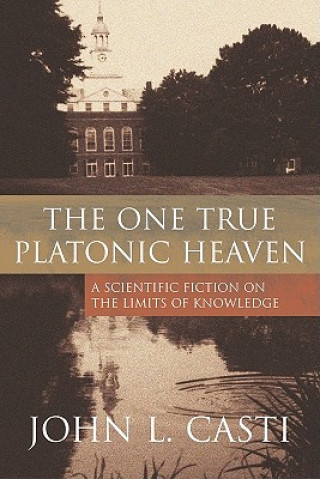
Versand
Kaufberater





Passt nicht? Macht nichts! Bei uns ist die Rückgabe innerhalb von 30 Tagen möglich
 Geschenkgutschein
In einem beliebigen Wert
Geschenkgutschein
In einem beliebigen Wert
Mit einem Geschenkgutschein können Sie nichts falsch machen. Der Beschenkte kann sich im Tausch gegen einen Geschenkgutschein etwas aus unserem Sortiment aussuchen.
One True Platonic Heaven
 Englisch
Englisch
 65 b
65 b
30 Tage für die Rückgabe der Ware
Das könnte Sie auch interessieren


By the author of The Cambridge Quintet, John L. Casti's new book continues the tradition of combining science fact with just the right dose of fiction. Part novel, part science -- wholly informative and entertaining. In the fall of 1933 the newly founded Institute for Advanced Study in Princeton, New Jersey, welcomed its first faculty member, Albert Einstein. With this superstar on the roster, the Institute was able to attract many more of the greatest scholars, scientists, and poets from around the world. It was to be an intellectual haven, a place where the most brilliant minds on the planet, sheltered from the outside world's cares and calamities, could study and collaborate and devote their time to the pure and exclusive pursuit of knowledge. For many of them, it was the "one, true, platonic heaven." Over the years, key figures at the Institute began to question the limits to what science could tell us about the world, pondering the universal secrets it might unlock. Could science be the ultimate source of truth; or are there intrinsic limits, built into the very fabric of the universe, to what we can learn? In the late 1940's and early 1950's, this important question was being asked and pondered upon by some of the Institute's deepest thinkers. Enter the dramatis personae to illuminate the science and the philosophy of the time. Mathematical logician Kurt Godel was the unacknowledged Grant Exalted Ruler of this platonic estate -- but he was a ruler without a scepter as he awaited the inexplicably indefinite postponement of his promotion to full, tenured professor. Also in residence was his colleague, the Hungarian-American polymath, John van Neumann, developer of game theory, the axiomatic foundations of quantum mechanics, and the digital computer -- stymied by the Institute's refusal to sanction his bold proposal to actually build a computer. One of Godel's closest friends figures large in this story: Albert Einstein, by common consensus the greatest physicist the 20th century had ever known. And, of course, the director the Institute, J. Robert Oppenheimer, the father of the atomic bomb, must by necessity be key to any story that focuses in on this time and place. Author Casti elegantly sets the stage and then masterfully directs this impressive cast of characters--with able assists by many "minor-character" icons like T. S. Eliot, Wolfgang Pauli, Freeman Dyson, and David Bohm, to tell a story of science, history, and ideas. As we watch events unfold (some of which are documented fact while others are creatively imagined fiction), we are witness to the discussions and deliberations of this august group...privy to wide-ranging conversations on thinking machines, quantum logic, biology as physics, weather forecasting, the structure of economic systems, the distinction between mathematics and natural science, the structure of the universe, and the powers of the human mind -- all centered around the question of the limits to scientific knowledge. Imaginatively conceived and artfully executed, The One True Platonic Heaven is an accessible and intriguing presentation of some of the deepest scientific and philosophical ideas of the 20th century.
Informationen zum Buch
 Englisch
Englisch
Kategorie


 Kontakt
Kontakt Wie einkaufen
Wie einkaufen























